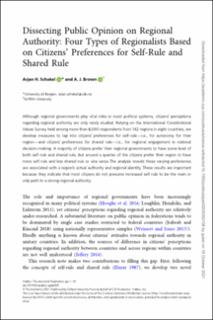Dissecting Public Opinion on Regional Authority: Four Types of Regionalists Based on Citizens’ Preferences for Self-Rule and Shared Rule
Journal article, Peer reviewed
Published version

Åpne
Permanent lenke
https://hdl.handle.net/11250/2977616Utgivelsesdato
2021Metadata
Vis full innførselSamlinger
Sammendrag
Although regional governments play vital roles in most political systems, citizens’ perceptions regarding regional authority are only rarely studied. Relying on the International Constitutional Values Survey held among more than 6,000 respondents from 142 regions in eight countries, we develop measures to tap into citizens’ preferences for self-rule—i.e., for autonomy for their region—and citizens’ preferences for shared rule—i.e., for regional engagement in national decision-making. A majority of citizens prefer their regional governments to have some level of both self-rule and shared rule, but around a quarter of the citizens prefer their region to have more self-rule and less shared rule or vice versa. The analysis reveals these varying preferences are associated with a region’s actual authority and regional identity. These results are important because they indicate that most citizens do not presume increased self-rule to be the main or only path to a strong regional authority.
